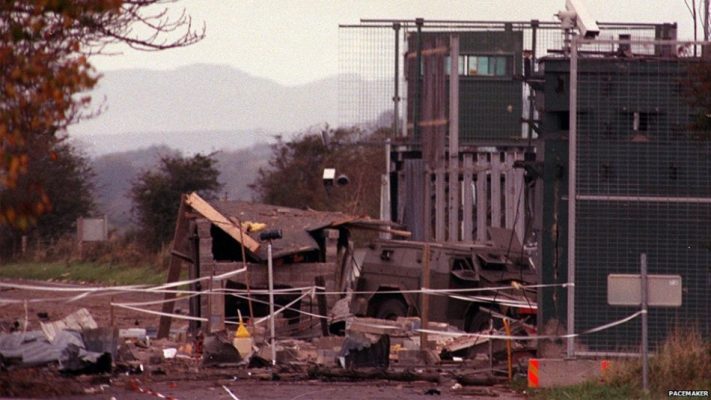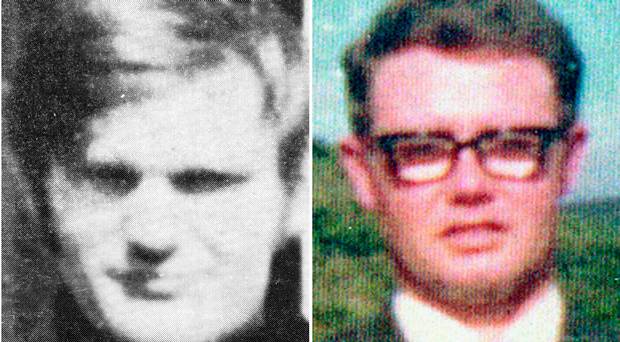
British Army checkpoint at Buncrana Road Derry blown up in October 1990 by IRA ‘human bomb’ which claimed the life of Patsy Gillespie who was strapped into bomb-laden car
On Wednesday at Westminster, Secretary of State Brandon Lewis outlined legacy proposals, including an end to future prosecutions.
This would affect both former British Army personnel as well as ex-paramilitaries.
There are currently live court proceedings in eight cases being dealt with by the Public Prosecution Service (PPS).
The PPS has said its work continues as normal in the absence of new legislation, which the government intends to introduce this autumn.
The current proceedings include charges against Soldier B and Soldier F dating back to Derry in 1972.
Both suspects have been granted anonymity.
A former director of public prosecutions in the North has questioned the legality of some of the proposals.
Barra McGrory QC said: “This is a shocking proposal issued by a government which claims to adhere to the rule of law in that is seeks to abolish completely all meaningful and judicial accountable processes.
“We’ve heard many arguments recently in the courts about the sovereignty of parliament and that parliament can undo anything it has previously done.
“But to take a step that would abolish a historical and ancient judicial process by which controversial deaths can be examined, the legality of that is very questionable.”
Soldier B’s case relates to the death of 15-year-old Daniel Hegarty in Derry in July 1972.
Soldier F is accused of the murders of James Wray and William McKinne on Bloody Sunday, as well as five attempted murders.
Earlier this month, both soldiers were told the PPS intended to withdraw proceedings.
This followed a decision in a separate case involving soldiers A and C who were accused of killing IRA man Joe McCann in Belfast in the same year.
The PPS found there were “related evidential features” between this case and those of soldiers B and F meaning there was no reasonable prospect of “key evidence” being used in their trials.
Under a statute of limitations proposed by the British government on Wednesday, there would be a ban on legal proceedings being taken in Troubles cases after a certain period of time.
The proposals also include an end to all legacy inquests and civil actions.
Prime Minister Boris Johnson told the Commons the package would help “draw a line under the Troubles”.

James Wray (left) and William McKinney murdered by British soldier on Bloody Sunday in Derry in January 1972
However, the government’s paper on the plans made no mention of what might happen to cases currently before the courts.
In a statement issued on Wednesday evening, the PPS said: “In the absence of any new legislation coming into force, there will be no change to how we exercise our statutory functions.
“We will continue to take decisions on cases submitted to us by investigating agencies and, where decisions to prosecute have been taken, we will seek to bring those cases to trial.”
In response to questions about live prosecutions, the British Government said: “We have published proposals for discussion with the Irish government, NI parties and others.
“There are many details that we want to consider with others as part of this process.”
Apart from Soldier B and Soldier F, the other live proceedings involve:
John Downey, accused of the murders of Ulster Defence Regiment soldiers Alfred Johnston and James Eames in 1972
James Fox, accused of murdering postal worker Frank Kerr during an IRA robbery at a sorting office in 1994
Winston ‘Winkie’ Rea, charged with the murders of Catholic civilians John Devine in 1989 and John O’Hara in 1991
James Smyth, charged in relation to the murders of Catholic workmen Gary Convie and Eamon Fox in 1994
Dennis Hutchings, a former soldier accused of the attempted murder of John Pat Cunningham in 1974
David Jonathan Holden, a former soldier charged in connection with the killing of Aidan McAnespie in 1998
There have been 37 cases in which the PPS has taken prosecutorial decisions since 2012.
These have involved republican and loyalist paramilitaries, as well as a number of cases involving former soldiers.
Tags:




